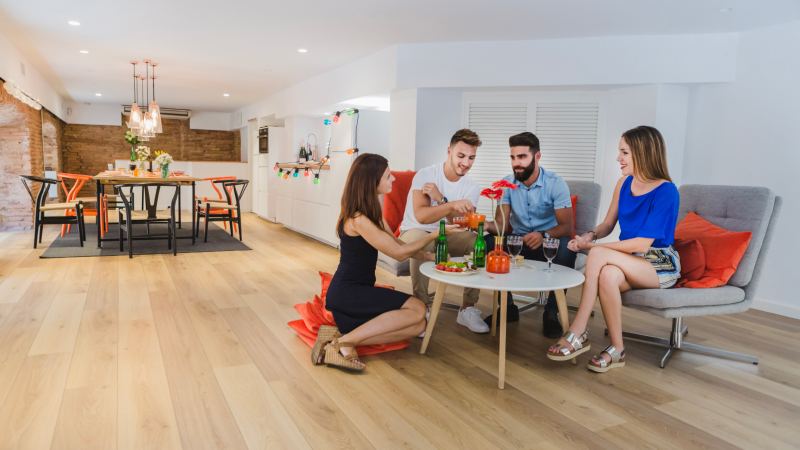The decision to upgrade one’s home flooring often comes with a desire for both aesthetics and functionality. Among the various options available to homeowners, engineered hardwood flooring has emerged as a sustainable and elegant solution. Its construction and the advantages it offers in terms of durability, installation, and environmental impact make it a compelling choice for many households.
The Composition of Engineered Hardwood Flooring
Engineered hardwood floors are composed of multiple layers. The top layer, also known as the wear layer, is a veneer of solid hardwood, which gives it the natural beauty and uniqueness characteristic of traditional solid wood floors. Beneath this is a core made up of several layers of plywood or high-density fibreboard (HDF), which are bonded together to create a stable and robust structure. This composition allows engineered floors to withstand variations in temperature and humidity better than solid wood flooring.
Installation Advantages
Installation is a significant consideration when choosing new flooring. Engineered hardwood flooring offers a more straightforward and flexible installation process compared to solid timber flooring. It can be installed over most existing floors, including concrete and old wooden floors, using methods like gluing, floating, or nailing. This ease of installation can reduce the overall cost and disruption typically associated with replacing floors.
Durability and Maintenance
When it comes to durability, engineered floors are designed to hold up well under heavy foot traffic and the demands of daily life. The multi-layer construction prevents the wood from warping and bowing in the way that solid hardwood can when subjected to changes in moisture levels. Moreover, the maintenance regime for engineered hardwood is relatively straightforward; regular sweeping or vacuuming and occasional damp mopping should keep the floors looking pristine for years.
Style and Versatility
Style is paramount when improving the aesthetic appeal of a home, and engineered hardwood flooring does not disappoint. Available in a range of species, finishes, and colours, it can offer the same warm and inviting look as solid wood with the added benefit of consistent quality in every plank. Whether a homeowner prefers the look of oak, maple, or walnut, there is an engineered hardwood to suit any interior design theme.
Sustainability: A Core Benefit
A critical advantage of engineered hardwood flooring is its sustainability. The manufacturing process for engineered flooring typically uses less-prized hardwood than solid wood floors, which contributes to forest conservation. Additionally, since the core layers can be made from fast-growing, less valuable species or recycled materials, it decreases the overall environmental footprint of the product.
Comparative Cost-Effectiveness
Cost is always an important factor when considering home improvements. In comparison to solid hardwood flooring, engineered wood flooring can be more cost-effective without compromising on the look and feel of the product. With engineered hardwood, the homeowner gets the luxurious appearance of hardwood at a fraction of the cost, and with lower installation prices, it offers excellent value for money.
Long-Term Value
The longevity of a flooring selection is integral to its value over time. Engineered wood floors are not just a short-term aesthetic upgrade; they can improve the resale value of a home. Often, prospective buyers see hardwood flooring as a desirable feature that is ready to enjoy immediately without the need for replacement or overhaul. This long-term appeal adds an extra dimension to the investment in engineered hardwood.
The Importance of Quality Selection
As with any home improvement choice, quality counts. When selecting engineered hardwood flooring, it’s essential to look at the thickness of the top veneer layer, the quality of the core layers, and the precision of the engineering. Higher-quality floors will have a thicker wear layer, which can be sanded and refinished, just like solid hardwood, extending the longevity of the floors even further.
Engineered Hardwood vs Traditional Solid Wood
While solid wood floors have been the traditional choice for centuries, engineered hardwood offers versatility that can be particularly advantageous in certain environments. For example, basements or spaces with radiant heating systems are places where solid hardwood might not be suitable due to moisture or temperature sensitivities, making engineered hardwood the superior option.
Considerations for Eco-Conscious Homeowners
Many homeowners today are environmentally conscious and seek out products that align with their commitment to sustainable living. Engineered hardwood flooring fits into this paradigm, offering a responsible choice without compromising on quality or aesthetics. Sourcing products from companies that adhere to strict environmental standards ensures that the flooring is not just beautiful but also kind to the planet.
Compatibility with Modern Lifestyles
Today’s fast-paced lifestyles require solutions that can keep up with our demands while maintaining a stylish home ambiance. Engineered hardwood flooring’s ease of maintenance, robustness, and quick installation align well with modern living, offering a hassle-free, beautiful foundation for everyday life.
The Role of Professional Installation
For homeowners looking to maximise the benefits of engineered hardwood, professional installation can be a smart investment. An experienced installer has the skills to ensure that the flooring is laid correctly, which can prevent issues and ensure the longevity of the flooring. Although engineered hardwood is more DIY-friendly than solid wood, the importance of a professional touch cannot be overstated when ensuring a flawless finish.
Final Thoughts
Engineered hardwood flooring represents a synthesis of beauty, durability, and sustainability, providing homeowners with a flooring solution that meets both aesthetic and practical needs. By integrating quality materials, a commitment to environmental consciousness, and a focus on enduring appeal, engineered hardwood stands as a wise investment for any discerning homeowner seeking to upgrade their home.
Its compatibility with various installation scenarios, coupled with a wide array of design options, makes it an adaptable and attractive choice for any space. When considering new flooring, it’s worth taking a closer look at the benefits that engineered hardwood flooring can bring to the table.

